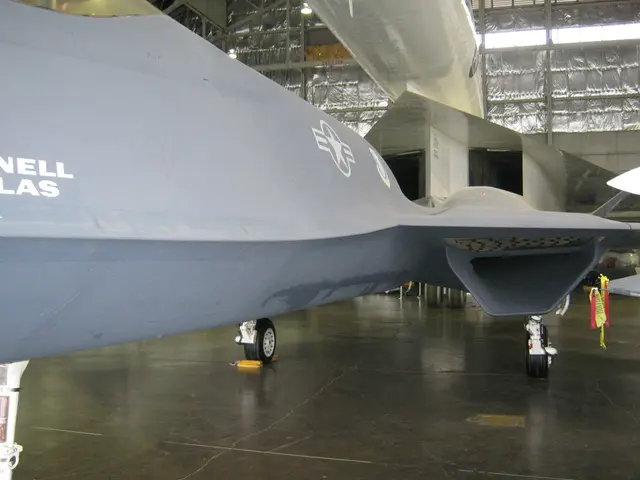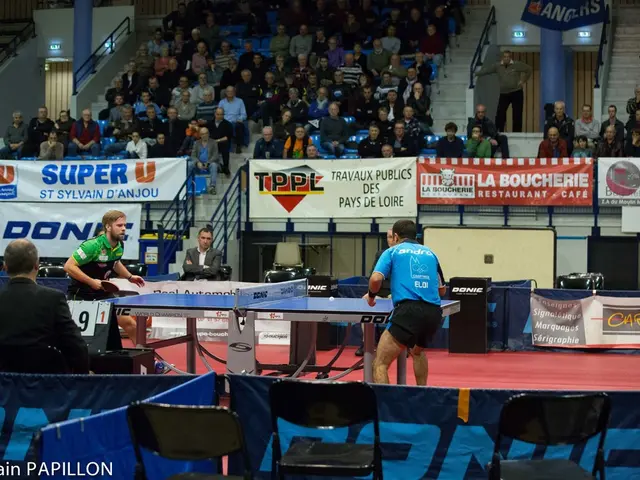Let's Talk 'Bout That Phone Call: Trump and Xi Jinping Chat on Trade War Tensions
Trump converses with Xi Jinping over the telephone.
Get ready for some international chit-chat! The big dogs of the global economy, US President Donald Trump and Chinese President Xi Jinping, reportedly had a recent phone call. The conversation, apparently initiated by Trump himself, marked the first time these two heavyweights have connected since January when Trump moved into the White House.
According to Xinhua, China's state-run news agency, the phone call took place, but details about the discussions between the leaders remain a secret. Neither the White House nor the Chinese Foreign Ministry has dished the dirt about thecontent of the conversation. But Trump weren't shy about revealing his feelings on his social media platform, Truth Social, stating yesterday that he does like Xi, but making a deal with the Chinese president is "extraordinarily difficult."
The Trade War: A Ping-Pong Match with High Stakes
With the ongoing trade conflict between these economic powerhouses heating up since Trump assumed office, any direct exchange between the two heads of state holds immense importance. Trump has been pushin' for a tough trade policy against China, escalating the existing conflict despite his claims of a good relationship with Xi.
In the past, the two countries have slapped each other with tariffs reaching a whopping 145% on US imports and China's retaliation with counter-tariffs. In May, both sides agreed to a brief pause in the trade escalation, even temporarily agreeing to reduce tariffs, only to maintain them at levels higher than pre-escalation times. However, the rough waters haven't exactly calmed down yet, with both parties still miles apart from reaching a solid agreement.
Tensions Rising Again: You Scratch My Back, I'll Scratch Yours
One hour before China's news about the Trump-Xi call was released, the Chinese Foreign Ministry criticized the US on the social media platform X, calling for fair competition in the market, an end to politicizing trade issues, and the creation of a fair and non-discriminatory environment for Chinese and foreign companies.
Beijing also expressed concern over the U.S.'s decision to revoke visas for Chinese students, stating that mobility allows for cooperation between countries.
In summary, while both sides have agreed to a temporary tariff reduction and high-level talks, the uncertain future of U.S.-China trade relations remains challenging and full of mistrust, with each side accusing the other of failing to fully adhere to the agreement's spirit.
- Trade Wars
- Trump
- Xi Jinping
- China-US Relations
- Tariffs
Sources: ntv.de and [dpa/DJ]
Enrichment Data:After the secretive phone call, high-level US officials, including the Secretary of the Treasury Scott Bessent, Secretary of Commerce Howard Lutnick, and United States Trade Representative Jamieson Greer, are scheduled to meet with Chinese representatives in London on June 9, 2025, in an attempt to resolve the ongoing trade disputes [1]. The agreement in May for a temporary tariff truce saw the US lowering its tariff on certain Chinese goods from 145% to 30%, and China reciprocating with a drop in its tariff on US goods from 125% to 10%, albeit maintaining tariffs at levels above pre-escalation times for a 90-day period [2][4]. However, China has accused the US of undermining the truce through measures such as export controls on AI chips and revoking student visas for Chinese citizens in the US [2]. The US and China are still far from reaching a resolution, with each side accusing the other of not fully honoring the spirit of the agreement [1][2][3]. [1]: https://www.usatoday.com/story/money/business/2025/05/26/china-tariff-truce-us-agrees-reduce-trade-barriers/124764498/ [2]: https://reuters.com/article/us-china-trade-dispute-exists/us-takes-further-action-on-tech-tariffs-trade-war-is-far-from-over-idUSKCN1SR1JM [3]: https://www.cnn.com/2025/05/26/politics/xu-tariffs/index.html [4]: https://www.pscp.tv/w/1_JVlqWbqOHzqM
- The recently concluded trade war discussions between US President Donald Trump and Chinese President Xi Jinping have stirred curiosity within the global community policy.
- Employment policies are expected to be a significant aspect of the high-level US-China talks in London, as tariff reductions could potentially generate job opportunities.
- The ongoing trade tensions between the US and China have left migration policies under scrutiny, with China expressing concern over US visa revocations for Chinese students.
- Conflicts and policy-and-legislation surrounding car-accidents have become more complex due to this trade war, considering the auto-racing and mixed-martial-arts industries' dependence on each country's economy.
- Political turbulence from the trade war has cast a shadow over general news, as the media scrutinizes developments in politics surrounding this conflict.
- Crime-and-justice agencies worldwide have shifted their focus to address any potential increase in illegal activities related to sports-betting, given the escalating tension between the two economies.
- Fires in various industries, like horse-racing and premier-league football stadiums, could face funding challenges due to the economic volatile state caused by the trade war.
- Sports like football, champions-league, and soccer might be impacted by the trade war, affecting the performance of teams sponsored by companies on both sides.
- In professional sports such as the NFL, WNBA, baseball, hockey, golf, and tennis, the trade war may lead to sponsorship changes and financial instability for some teams.
- The trade war has created a challenging environment for sports-betting companies, as market uncertainties could affect betting odds and clientele from both countries.
- European leagues in sports like basketball, basketball (NCAAB), and football (MLS) could face potential sponsorship changes due to the economic volatility caused by the trade war.
- After the Trump-Xi phone call, weather-forecasting agencies could see a decrease in funding for meteorological research due to the economic instability created by the trade war.
- Racing-related industries, such as auto-racing, American football (NFL), and horse-racing, are currently facing uncertainties due to the trade war policy, potentially impacting their future growth.
- The trade war has led to mistrust between the two nations, making cooperation in areas like sports-analysis and weather-forecasting challenging.
- In the ever-evolving world of weather, Sergei Petrov, a leading weather forecaster, predicts that the unstable US-China trade relationship could lead to extreme weather events, such as increased hurricanes and typhoons.
- Racing enthusiasts are worried about the potential cancellation or postponement of the Masters, the Grand Prix, and other prestigious races due to the political instability caused by the trade war.
- With the ongoing trade dispute, online sports betting platforms like Bet365 and FanDuel are offering special bonuses and promotions for bettors to wager on the possible outcomes of the trade war negotiations.
- The Serie A and La Liga football competitions could see reduced TV viewership due to the trade war, affecting the revenues of broadcasting companies.
- NBA fans are optimistic that the trade war will not directly affect basketball, as the league has previously demonstrated its ability to adapt to political turbulence.
- In the face of all these uncertainties, economists and policymakers are closely monitoring the situation, urging both countries to work towards a resolution to mitigate the adverse effects on various industries, such as sports, weather prediction, and international relations, caused by the ongoing trade war.








